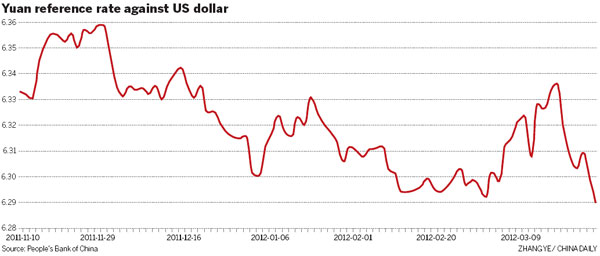 |
|
|
|
|||||||||||

China's central bank set the daily reference rate for the yuan against the dollar at 6.2891 on Friday, marking the first time the rate has fallen below 6.29 since China began to reform its system for setting exchange rates in 2005.
"The change conforms to our expectations as China strengthens its reform of the mechanism to set currency exchange rates and shows some compromises with external pressures," said Wang Tao, head of China economic research at UBS Securities Co Ltd.
Although the country has seen capital outflows since the fourth quarter last year, she predicted the yuan will appreciate by 2 to 3 percent in 2012.
Since the start of the year, the reference rate for the yuan's exchange rate against the dollar has only increased by 0.19 percent. In January, China's yuan depreciated by 0.17 percent.
Although the reference rate was set higher, the actual trading rate for the yuan against the greenback went down to 6.3062, showing that the demand for the yuan remains weak. The yuan is permitted to move as much as 0.5 percent either above or below the daily reference rate.
Some analysts said China's increasing short-term external debt will bring the country under greater pressure to sell off yuan.
The amount of China's outstanding short-term external debt stood at $500.9 billion by the end of 2011, up by 33 percent year-on-year, according to data released by the State Administration of Foreign Exchange on Thursday.
Wang denied that the central bank had set the higher reference rate out of a desire to shore up the yuan while the demand for the currency decreases.
"Usually China's currency policy is relatively independent and doesn't have a very close connection to market demand."
The yuan's appreciation trend is still intact and recent market concerns over Chinese growth prospects are overblown, said Khoon Goh, a foreign exchange researcher at the Australia and New Zealand Banking Group Ltd.
"We continue to look for yuan appreciation this year and are comfortable with our year-end target of 6.14, with the pace of appreciation to pick up over the second half," Goh said.
Twelve-month non-deliverable forwards strengthened by 0.15 percent on Friday to close at 6.3240 against the dollar, a 0.4 percent discount to the onshore spot rate. And the yuan rose by 0.19 percent to 6.3048 in Hong Kong's offshore market, according to data compiled by Bloomberg.
Zhao Xijun, deputy head of the School of Finance at Renmin University of China, said the central bank determines the yuan's daily reference rate by asking market players what they think the price should be.
"The rate system is already primarily based on market conditions," Zhao said. "And the central bank is insisting that the market should play a bigger role and there should be less intervention."
He said the currency's recent appreciation is probably the result of an additional influx of capital into the country.
Han Shi, a researcher at the Western Securities Co Ltd, said the central bank's support of yuan appreciation will further weaken the country's export advantages and stoke domestic demand at a time that the global economy remains bleak.
"It looks like China's economy is undergoing a de-stocking process, as new orders decline at a faster rate, and both inventory and output move from expansionary territory in February to contractionary territory in March," said Zhang Zhiwei, chief economist for China at the Japan-based financial services company Nomura Holdings Inc.
wangxiaotian@chinadaily.com.cn